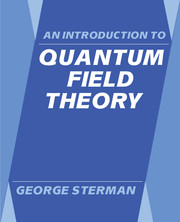Book contents
- Frontmatter
- Contents
- Preface
- PART I SCALAR FIELDS
- PART II FIELDS WITH SPIN
- PART III RENORMALIZATION
- PART IV THE NATURE OF PERTURBATIVE CROSS SECTIONS
- 12 Perturbative corrections and the infrared problem
- 13 Analytic structure and infrared finiteness
- 14 Factorization and evolution in high-energy scattering
- 15 Epilogue: Bound states and the limitations of perturbation theory
- APPENDICES
- References
- Index
14 - Factorization and evolution in high-energy scattering
Published online by Cambridge University Press: 05 August 2012
- Frontmatter
- Contents
- Preface
- PART I SCALAR FIELDS
- PART II FIELDS WITH SPIN
- PART III RENORMALIZATION
- PART IV THE NATURE OF PERTURBATIVE CROSS SECTIONS
- 12 Perturbative corrections and the infrared problem
- 13 Analytic structure and infrared finiteness
- 14 Factorization and evolution in high-energy scattering
- 15 Epilogue: Bound states and the limitations of perturbation theory
- APPENDICES
- References
- Index
Summary
Most zero-mass and high-energy cross sections are not directly calculable in perturbation theory, because of the presence of large logarithms of energy over mass (see the comments at the end of Chapter 13). Nevertheless, events with large momentum transfer are the result of violent short-distance collisions, which one can isolate quantitatively. The separation of calculable short-distance from incalculable long-distance effects is known as factorization. Deeply inelastic scattering cross sections illustrate this property. They may be used, in turn, to compute a wide class of other inclusive and semi-inclusive cross sections with large momentum transfers. The evolution in momentum transfer of deeply inelastic and related cross sections may also be determined by methods related to both the renormalization group and the parton model. The operator product expansion gives an alternate interpretation, which generalizes factorization beyond leading power behavior, at least in deeply inelastic scattering.
The examples of this chapter, in which the above results are derived and discussed, are drawn primarily from QCD, but the techniques of factorization and the operator product expansion are generally applicable in field theory. They transcend low-order calculations, by systematically organizing contributions from arbitrary orders of the perturbative expansion.
Deeply inelastic scattering
As an introduction, and to facilitate calculation, we first discuss tensor analysis and kinematics for the leptoproduction amplitude (Roy r1975, Close r1979), in which a lepton scatters from a hadron of momentum pμ to produce an arbitrary hadronic state with momentum pn.
Information
- Type
- Chapter
- Information
- An Introduction to Quantum Field Theory , pp. 449 - 491Publisher: Cambridge University PressPrint publication year: 1993
